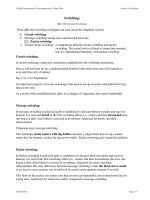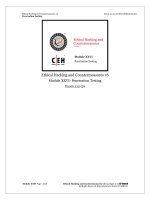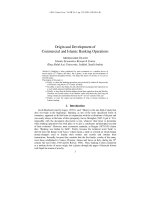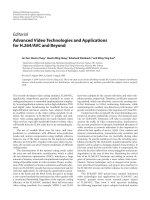Lecture Retail and merchant banking – Lecture 26
Bạn đang xem bản rút gọn của tài liệu. Xem và tải ngay bản đầy đủ của tài liệu tại đây (68.56 KB, 46 trang )
Revise Lecture 26
Lecture 26
•
Banker and
Customer
Banker and Customer
The Banker
•
•
•
The role of a banker is one filled with
multiple duties and responsibilities.
There are different types of bankers and
each one is unique in his own way.
Some of these individuals work for large
corporate conglomerates while others
work for small town financial institutions.
Banker and Customer
The Banker
•
•
•
Each banker has his own set agenda in
his role as a banker.
A banker is an individual (or an institution)
who advises his clients with regard to
financial matter.
The duties concerning saving, loans,
taxes, investment and securities are all
within the job realm of a banker.
Banker and Customer
•
The Banker
He will provide financial assistance to the
client in accordance with their needs.
Banker and Customer
•
The Customer
Banker and Customer
The Customer
•
•
In banking, a customer is someone who
makes use of or receive the services of
the bank.
The word customer historically derives
‘custom’ meaning habbit, so a customer
was someone who frequented a particular
shop, who made it a habbit to purchase
goods there
Banker and Customer
Duties of a Customer
All banks carry out the customer’s
instructions in a business-like manner.
In return, the customer has special duties of
cooperation and other duties of care.
A customer is bound to the following;
Banker and Customer
Duties of a Customer
1.
2.
3.
Communication of important information
and changes.
Unambiguous information in orders and
instructions
Care in transmission of particular orders
Banker and Customer
•
Duties of a Customer
4. Use of forms
5. Express notification of any special
instruction
6. Notification of time limits and dates
7. Complaints to be made immediately
8. Checking of confirmation of the bank
9. Liability arising from neglect of duty
Banker and Customer
•
Banker’s obligation to protect
customer secrecy
Banker and Customer
•
•
The obligation of a banker to observe
secrecy relating to affairs of his customers
is an implied term of the contract between
a banker and his customer.
A banker would not divulge to third
persons, without the consent of the
customer, express or implied, either the
state of the customer’s account or any of
his transactions with the bank.
Banker and Customer
•
Banker’s right to charge
interest and commission
Banker and Customer
Banker’s right to charge interest and
commission
•
•
The bank generates its profits from the
differential between the level of interest it
pays for deposits and other sources of
funds, and the level of interest it charges
in its lending activities.
All banks at any time and form time to time
are entitled to charge the rate of interest
on loan either by express agreement or
Banker and Customer
Banker’s right to charge interest and
commission
•
•
They also entitled to charge compound
interest and commission for services
rendered to the customer.
In the absence of an express agreement
or without due notice, a bank is not
allowed to debit charges at any date other
than the customary dates.
•
Banker’s Right to Lien
Banker and Customer
Banker’s Right to Lien
•
A lien is the right of a creditor in
possession of goods, securities or any
other assets belonging to the debtor to
retain them until the debt is repaid,
provided that there is no contract express
or implied, to the contrary.
Banker and Customer
Banker’s Right to Lien
•
•
Lien is, in its primary sense, a right in one
man to retain that which is in his
possession belonging to another until
certain demands of the person in
possession are satisfied.
In its primary sense, it is given by law and
not by contract.
Banker and Customer
Banker’s Right to Lien
•
•
A banker’s lien on negotiable securities
has been judicially defined as ‘ an implied
pledge’.
A banker has, in the absence of
agreement to the contrary, a lien on all
bills received from a customer in the
ordinary course of banking business in
respect of any balance that may be due
from such customer.
•
Banker’s right of set-off
Banker and Customer
Banker’s right of set-off
•
•
•
The of right of set-off is also known as the
right of combination of accounts.
A bank has a right to set-off a debt owing
to a customer against a debt due from
him.
‘A legal set-off is where there are mutual
debts between the plaintiff and the
defendant, or if either party sue or be sued
Banker and Customer
Banker’s right of set-off
•
•
•
From a commercial standpoint, a right of
set-off is a form of security (right) for a
lender.
It is an attractive security because its
realization does not involve the sale of an
asset to a third party.
A set-off must be in the form of a cross
claim for a liquidated amount, and it can
•
Deposit Account
Banker and Customer
Deposit Account
•
•
•
The main banking activities consist of
acceptance of deposit from the public for
the purpose of lending to businessmen
and others who may seek loans.
Actually, the money deposited in any bank
is mostly the saving of the people.
Money may be needed in future for
various purposes such as medical
Banker and Customer
Deposit Account
•
•
So people keep their savings with
someone where it will both be safe and
earn a return.
A bank is a such place where money once
deposited remains safe and also earns
profit.









